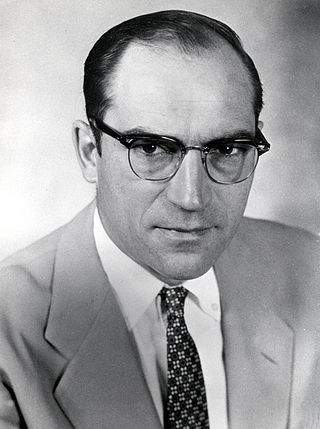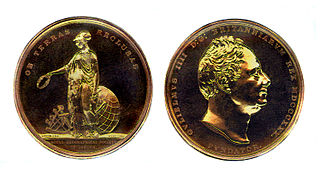Related Research Articles

A geographer is a physical scientist, social scientist or humanist whose area of study is geography, the study of Earth's natural environment and human society, including how society and nature interacts. The Greek prefix "geo" means "earth" and the Greek suffix, "graphy", meaning "description", so a geographer is someone who studies the earth. The word "geography" is a Middle French word that is believed to have been first used in 1540.
Edward Max Nicholson was a pioneering environmentalist, ornithologist and internationalist, and a founder of the World Wildlife Fund.

The Royal Geographical Society (with the Institute of British Geographers), often shortened to RGS, is a learned society and professional body for geography based in the United Kingdom. Founded in 1830 for the advancement of geographical sciences, the society has 16,000 members, with its work reaching the public through publications, research groups and lectures.

Luna Bergere Leopold was a leading U.S. geomorphologist and hydrologist, and son of Aldo Leopold. He received a B.S. in civil engineering from the University of Wisconsin in 1936; an M.S. in physics-meteorology from the University of California, Los Angeles in 1944; and a Ph.D. in geology from Harvard University in 1950.

The Victoria Medal is an award presented by the Royal Geographical Society. It is awarded "for conspicuous merit in research in geography" and has been given since 1902, in honour of the late Queen Victoria. Up until then, the society's Patron's Medal had alternatively been known as the "Victoria Medal", and the new medal resembled its original design.

The Royal Geographical Society's Gold Medal consists of two separate awards: the Founder's Medal 1830 and the Patron's Medal 1838. Together they form the most prestigious of the society's awards. They are given for "the encouragement and promotion of geographical science and discovery." Royal approval is required before an award can be made.
Alice Mary Coleman was a British geographer. A professor at King's College London, she was noted for directing the 1960s Second Land Use Survey of Britain, as well as for analyses of land use planning and urban design which have influenced the design of residential developments since the 1980s. She was a member of the Freedom Association.
Hans Bobek was an Austrian geographer. After his studies in geography at the University of Innsbruck, where Johann Sölch—a pupil of Albrecht Penck in Vienna—was his main teacher, he became professor of geography at the University of Vienna (1951–1971). Bobek is noted for his works on cultural and social geography, urban geography as well as on the regional geography of the Near and Middle East, then primarily known as the "Orient". He was, among others, the author of Iran: Probleme eines unterentwickelten Landes alter Kultur. His theory about rural and urban interactions was called Rentenkapitalismus; another important output was the theory of cultural steps (Kulturstufentheorie).
Leon McCarron is a Northern Irish adventurer, filmmaker and author. He is a Fellow of the Royal Geographical Society, and specialises in storytelling via long distance, human-powered journeys. Most recently, he walked 1000 miles from Jerusalem to Mount Sinai along a series of new hiking trails in the region.
The Cherry Kearton Medal and Award is an honour bestowed by the Royal Geographical Society on "a traveller concerned with the study or practice of natural history, with a preference for those with an interest in nature photography, art or cinematography". It is named for nature photographer Cherry Kearton and was launched in 1967.
Henrietta Hutton (1939–1963) was a British ornithologist and a founding member of the Oxford University Women's Exploration Club. The Henrietta Hutton Research Grant was established in Henrietta's name in 1964 with a financial endowment of about £5,000, which has been administered by the Royal Geographical Society from 1964 to present. The grants are used to fund geographical fieldwork by undergraduate and postgraduate students. Originally awarded to female geographers from the University of Oxford, the awards are now open to male and female applicants from any UK Higher Education Institution. To date, over 130 students have received a Henrietta Hutton Research Grant to support overseas geographical fieldwork.
Alfred Thomas Grove, known more commonly as Dick Grove, was a British geographer and climatologist. He was Emeritus Fellow of Downing College, Cambridge and a Director of the Centre of African Studies at the University of Cambridge. Grove researched Environmental Issues and Policy and the landscape change in southern Europe and Climate change and desertification with a focus on Africa and southern Europe. He was awarded the Busk Medal from the Royal Geographical Society in 1982 for his field work in Africa.
Jean Tricart was a French geomorphologist. In 1948, he became a professor at the University of Strasbourg, where he remained for the rest of his career. The Tricart's doctoral thesis dealt with the Paris Basin and resulted in a publication acclaimed in France. He often collaborated with his friend André Cailleux. From 1962 to 1974, he and Callieux published five works on the subject of geomorphology and climate. Most of his works were published in French.
Rita Ann Moden Gardner, is a British geographer and academic, specialising in geomorphology. Since January 2019, she has been Chief Executive of the Academy of Social Sciences. She taught at St Catherine's College, Oxford (1978–1979), King's College, London (1979–1994), and finally at Queen Mary and Westfield College (1994–1996) where she was Reader in Environmental Science. From 1996 to 2018, she was Director of the Royal Geographical Society: she was the learned society's first female director.
Nina Laurie is a British geographer and academic. Since 2016, she has been Professor of Geography and Development at the University of St Andrews.
Claudio Vita-Finzi, is an Australian-British geologist and academic. He was Professor of Neotectonics at University College London from 1987 to 2001, and has been a scientific associate at the Natural History Museum, London since 2001. His research is interdisciplinary, and involves the application of tectonics and planetary science on landscape change: this has led to him working alongside archaeologists and climatologists among others. He studied at St John's College, Cambridge.

Bhaskar Vira is an Indian academic, professor of Political Economy, and the current Pro Vice Chancellor for Education for Cambridge University. From 2019 until 2022 he was Head of Department of Geography, University of Cambridge. He was the founding director of the University of Cambridge Conservation Research Institute, and is a fellow of Fitzwilliam College, Cambridge. In 2018, he was awarded the Busk Medal by the Royal Geographical Society for his contributions in the fields of environment, development and economy. In 2021, he was elected to a Fellowship of the Academy of Social Sciences for his contributions to social science.

Tamotsu Nakamura, FRGS, is a Japanese explorer, alpinist, photographer and author. Since 1990, he has explored the mountainous areas between the Himalayas and the Sichuan basin; which he documents in photographs. He is a leading authority on the Alps of Tibet, the south-eastern sector of the Tibetan high plateau.

Douglas Laird BuskKCMG (1906–1990) was a British diplomat, mountaineer and geographer.
Emma Mawdsley is a professor of geography at University of Cambridge and a Fellow of Newnham College, Cambridge. Since 2024, she has been head of the Department of Geography at the University of Cambridge.
References
- 1 2 "A history of the Society's medals and awards". Royal Geographical Society. Retrieved 28 October 2022.
- ↑ RGS-IBG (2022). "Medals and Awards". OSF. RGS-IBG. doi:10.17605/OSF.IO/QSDT4 . Retrieved 9 December 2024.
- ↑ "Busk Award recipient - Professor James D Sidaway". www.rgs.org. 17 May 2022. Retrieved 28 October 2022.